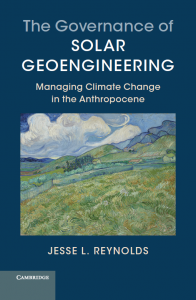The Governance of Solar Geoengineering
The Governance of Solar Geoengineering: Managing Climate Change in the Anthropocene
Jesse L. Reynolds
Cambridge University Press
Order at Cambridge University Press, Amazon US, Amazon Canada, Amazon UK, Amazon Germany, Bol (NL).
Read online (with access through e.g. a university) at Cambridge University Press
 Climate change is among the world’s most important problems, and solutions based on emission cuts or adapting to new climates remain elusive. One set of proposals receiving increasing attention among scientists and policymakers is “solar geoengineering,” (also known as solar radiation modification) which would reflect a small portion of incoming sunlight to reduce climate change. Evidence indicates that this could be effective, inexpensive, and technologically feasible, but it poses environmental risks and social challenges. Governance will thus be crucial. In The Governance of Solar Geoengineering, Jesse Reynolds draws on law, political science, and economics to show how solar geoengineering is, could, and should be governed. The book considers states’ incentives and behavior, international and national law, intellectual property, compensation for possible harm, and nonstate governance. It also recommends how solar geoengineering could be responsibly researched, developed, and – if appropriate – used in ways that would improve human well-being and ensure sustainability.
Climate change is among the world’s most important problems, and solutions based on emission cuts or adapting to new climates remain elusive. One set of proposals receiving increasing attention among scientists and policymakers is “solar geoengineering,” (also known as solar radiation modification) which would reflect a small portion of incoming sunlight to reduce climate change. Evidence indicates that this could be effective, inexpensive, and technologically feasible, but it poses environmental risks and social challenges. Governance will thus be crucial. In The Governance of Solar Geoengineering, Jesse Reynolds draws on law, political science, and economics to show how solar geoengineering is, could, and should be governed. The book considers states’ incentives and behavior, international and national law, intellectual property, compensation for possible harm, and nonstate governance. It also recommends how solar geoengineering could be responsibly researched, developed, and – if appropriate – used in ways that would improve human well-being and ensure sustainability.
Contents:
- Introduction
- Climate Change and Solar Geoengineering
- Solar Geoengineering and Emissions Abatement
- International Relations
- International Law: Legal Norms, Principles, Custom, and Organizations
- International Law: The Climate and Atmosphere
- International Law: Human Rights
- International Law: Other Agreements
- US Law
- Nonstate Governance
- Nonstate Actors and Intellectual Property
- International Compensation and Liability
- A Path Forward
- Conclusion
Advance praise:
Reynolds has written the go-to guide to solar geoengineering governance. Sober, balanced, and comprehensive – essential reading for proponents and skeptics alike.
– Daniel Bodansky, Regents’ Professor, Arizona State University and author of The Art and Craft of International Environmental Law
This book thoughtfully lays out some governance considerations that solar geoengineering would instigate. As Reynolds suggests, we should pay attention to these issues, including the necessary norm building and international cooperation, sooner rather than later.
– Jane Long, former associate director for energy and environment, Lawrence Livermore National Laboratory
Some forms of solar geoengineering (also known as solar radiation modification) would require unprecedented international governance. As interest rises in these technologies, governments and non-state actors should address the governance challenge now, before events potentially overtake. Reynolds’ book is a timely contribution to a more informed global discussion.
– Janos Pasztor, executive director of the Carnegie Climate Geoengineering Governance Initiative and former United Nations Assistant Secretary-General for Climate Change
Jesse Reynolds has written the best book-length examination of the governance of solar geoengineering to date, a work that will serve as an introduction for newcomers and provide insights for specialists. Reynolds writes with a distinct but coherent point-of-view while maintaining an openness to other perspectives. Put this on your reading list of you care about planetary-scale environmental governance.
– David Keith, Gordon McKay Professor of Applied Physics and Professor of Public Policy, Harvard University
Reviews:
Reynolds offers a sweeping review… Even those who most strongly disagree with Reynolds’ ultimate positions will be forced to think by his careful argumentation.
– Simon Nicholson, co-executive director of the Forum for Climate Engineering Assessment, and assistant professor and director of the Global Environmental Politics program in the School of International Service, American University, in Global Environmental Politics
“a ‘must read’ for any political scientist or economist trying to understand how to manage [solar #geoengineering] on various levels and will remain a key reference for the foreseeable future”
– Axel Michaelowa, head of “International Climate Policy” research group, Political Economy and Development Department, University of Zurich and Managing Director, Perspectives Climate Research, in Environmental Politics
Reynolds’s book is an important and timely contribution to the literature of solar engineering law and governance… It will be of interest to academics, policymakers and experts, proponents and opponents of solar geoengineering.
– Manon Simon, PhD candidate, and Jeffrey McGee, associate professor in climate change, marine and Antarctic law, Faculty of Law and Institute for Marine and Antarctic Studies, University of Tasmania, Tasmania, Australia, in Australian Journal of Maritime & Ocean Affairs
The Governance of Solar Geoengineering draws together a significant body of thought that bears on SRM governance, and it provides a helpful survey of the legal background against which SRM research and development have begun to take place… [T]his is an important contribution to the literature, and as one of the first single-authored academic books on governance of solar geoengineering, it should be widely read.
– Marion Hourdequin, associate professor and chair, Philosophy Department, Colorado College, in Ethics, Policy & Environment
His comprehensive and in-depth analysis is a valuable “toolbox” for policymakers, and it unveils multiple routes for further research for scholars.
– Haomiao Du, postdoctoral researcher, School of Law, Utrecht University, in Climate Law
